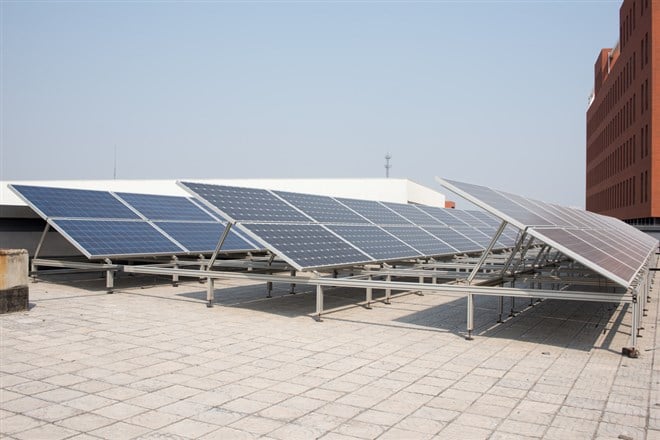Daqo Contracts During 4th Quarter, Becomes Value Play for 2023 Daqo New Energy contracts on the 4th quarter of 2022, something to be expected for the whole solar industry. Markets would be surprised by the annual results
This story originally appeared on MarketBeat

Warren Buffet said, "The market is a system of transferring money from the impatient to the patient." This saying and the underlying implications could not go better with what is going on with this latest quarterly announcement.
Daqo New Energy (NYSE: DQ) shares have declined by roughly 6.5% in the dawn of pre-market trading. This is solely due to the short-term nature of most investors, who cannot see past their shadows upon receiving the news that the firm contracted during the fourth quarter of 2022.
While most headlines focus on putting out the quarterly results first, some savvy investors are scrolling down to look at the full-year results knowing that the fourth quarter is a seasonal and expected cyclical slow period for the whole solar PV industry, not just for Daqo.
Mindboggling results
Some dark corners of the market, where the value investors live, may be looking at the price action after digesting the annual results with confused looks on their faces. Despite an inflationary environment repleted with supply chain issues and uncertainties revolving around orders and future demand, Daqo accomplished something fit for a blue chip company.
Management had guided at the beginning of 2022 for a total production capacity of 130,000 to 132,000 metric tons of polysilicon, the year ended with a total volume of 133,812 metric tons, not only beating guidance but also increasing by 54.5% compared to 2021's 86,587 metric tons production volume. Combining this rise in volume output with a record-high period of polysilicon prices in the open market - averaging $38/kg compared to a normalized $15/Kg - and accountants may have had to rub their eyes when putting down a 174.5% increase in revenue year on year.
Inflation has also played its dirty hand into the polysilicon markets this past year, with the cost per kilogram of production rising to $7.69/Kg from 2021's $6.82/kg representing a 12.75% increase. Despite these aggressive input cost pressures, the commodity increase in the open market was enough to offset the rising costs, as Daqo expanded its gross margins by ~900 basis points to 74% for the full year.
Making a list and checking it twice
Management was very pleased to deliver record year cash flows despite one of the hardest business cycles the company has had to operate under; these cash flows and otherwise net income - for accounting purposes - has sent a tremendous gift to all those ADS (American Depository Shares) investors who landed on the nice list - by holding onto the stock and not focusing on quarterly results alone -.
EPS for ADS holders more than doubled from $9.67 on an adjusted EPS basis in 2021 to an adjusted EPS of $24.06 in 2022, partly fueled by share buybacks. This represents an earnings increase of 147% in just one year.
But wait, there's more... Management is providing guidance indicating that this may not be a fluke of a year, despite the firm showcasing meme stock-like growth numbers; this may only be the beginning of a multi-year run.
Chicken or the egg
As Ray Kroc said in the movie "The Founder" when trying to convince restaurant owners to buy his multi-mixer: "Increase the supply, and the demand will follow."
Wouldn't it be nice to blindly increase the supply knowing that the demand is going nowhere but up? Because that is exactly what Daqo's management is portraying in their guidance and expansion record over the years.
As little back as 2015, the company had a total production capacity of 12,150 metric tons of polysilicon; today, management has undertaken a fifth expansion phase to keep this growth coming and then some. Mongolia will be the honorable guest to cut the red ribbon and open Daqo's newest manufacturing facility. Expected to be fully operational by 2023, this new project will increase the total production volume capacity to 190,000-195,000 metric tons of polysilicon.
It does not take a rocket scientist to figure out that at a median of 193,000 metric tons, with an average selling price - even if markets cool - of $30/Kg, revenues for 2023 can be expected to be approximately $4.0 billion USD, keeping the current level the company has achieved relatively flat. More importantly, if markets do cool for the commodity, this would also translate into a maintained gross margin level, thus leaving the firm plenty of room to maneuver.
With global solar PV installations up 53% year over year, and China alone increasing its installations by 59%, management and markets alike would be sane to expect moderate to high growth in the following years as the focus becomes independency from fossil fuel sources and breakthroughs in the renewable energy markets. This aggressive demand growth that is to be expected positions Daqo tremendously well as the lowest-cost and one of the highest-quality polysilicon manufacturers in the market.
Switching to solar?
Based on the latest financials the company has reported, analysts are right to point out a consensus 66% upside for the stock price. Some may even point to the higher range for price targets looking at the current book value per share of $86, backed by a Net Asset Value (NAV) per share of $94.7.
Trading at a weekly Fibonacci retracement level between 61.8% and 78% also known as "The Golden Ratio", enjoying bullish weekly divergences on RSI and MACD indicators, there is both a fundamental and technical case to be had for investors to keep an eye on this stock at the top of their watchlists for this week.









